by Labhesh | Nov 30, 2020 | Admissions counselling, Motivation, study abroad, Test, Toefl

Can You Predict Your TOEFL Score?
It is entirely expected to think about how you have done after you taking TOEFL. You might want to foresee your score or approach someone to anticipate it for you. Be that as it may, did you realize that it is troublesome or practically difficult to anticipate a precise score for your TOEFL? Is it accurate to say that you are shocked? Here is the answer to the question of “Can You Predict Your TOEFL Score?”.
However, before knowing the answer to “Can You Predict Your TOEFL Score?” this question, you should know how is TOEFL graded.
For what reason wouldn’t you be able to Predict Your Score?

reason why you can’t predict the TOEFL score
To begin with, TOEFL is a standardized test. That implies other than your capacity and execution that day, your score additionally relies upon the type of test you take that day. The TOEFL graders utilize a framework called comparing when evaluating your TOEFL scores. The equating procedure is the procedure when you utilize a calculation that can represent the way that a few tests are somewhat more troublesome or simpler than others. All together for a standardized test to be reasonable, the comparing framework will round out the hole between the simpler and more troublesome tests. Since we don’t have the foggiest idea what the calculation is, we can’t compute or foresee how well you will score regardless of whether you know what number of questions you think you got right.
Second, your outcomes during your training test can’t generally accurately foresee your outcomes for the genuine test. Indeed, even the most credible practice test can’t represent all the flighty components that occur during the genuine test, as startling interruptions, an awful night’s rest, feeling unwell, or having numerous inquiries that happen to be in your quality or shortcoming territories. Despite the fact that TOEFL is a standardized test, we as a whole realize that no test can 100% effectively legitimize one’s scholastic capacity, so in the event that you need to depend on your past exhibition on your training tests to figure your genuine outcomes, proceed. It is as yet a decent anchor; in any case, recollect that it won’t be 100% right.
Third, scholastic English in the TOEFL test is totally different from typical conversational English, so your capacity to communicate in English all the time and flourish in social circumstances is definitely not an adequate marker for your achievement in the TOEFL.
What You Can Do?

what you can do
Since the TOEFL is a standardized test, concentrating on the total number of right answers doesn’t generally show your last score on a genuine test. So, all things being equal, while taking a training test, focus on progress and improvement rather than complete number of right answers.
You should take in any event at least three full recreated practice tests during the way toward studying for the TOEFL. Take one full practice test toward the start of your TOEFL arrangement. This test will give you a benchmark score and fill in as the starting line for your studying.
Afterwards, about a month or two preceding your genuine test take another full practice test to check whether you are prepared. The aftereffect of this test, when contrasted and the primary full practice test you took toward the start of your investigation, will give you a thought of what amount have you improved.
Finally, take your third practice test about possibly 14 days before your real TOEFL test. Not exclusively will it help you see considerably more movement, however will permit you to turn out to be more confident and experienced taking TOEFL.
Try not to stress over the scores of the three tests, particularly the third one. For instance, if your objective is 96 and you just scored 94 on your third practice test, don’t stress over it. There are numerous different elements included while stepping through the exam that might possibly by present on the day you step through the genuine examination and these elements can influence you more than you might suspect. Try not to stress over the score, however about your performance and progress.
Rather than focusing on a numeric score, attempt to be a pragmatist and focus on a non-numeric objective. Having an objective that centres more around your advancement will assist you with having more beneficial investigation meetings and feel more inspired. Each progress you cause will to be considered a triumph for a non-numeric objective. While with a numeric objective, each progression you’ll make is a disappointment of not meeting the objective yet.
Get yourself helpful a versatile internet learning instrument that can figure and give you a scope of scores dependent on your qualities, shortcomings, and execution. Utilizing such an instrument will give you a greatly improved sign on where you stand, so you can settle on a decent choice before taking the TOEFL. On the off chance that you are far away from your objective score consider deferring the test for a later date. The TOEFL can be exorbitant and delaying the test could assist you with getting the score you need on your first attempt.
Also, know the TOEFL Scores and its conditional acceptance.
by Labhesh | Nov 26, 2020 | Admissions counselling, Motivation, study abroad, Test, Toefl
In the event that you are a non-native English speaker who needs to learn at an institution in an English-speaking nation, more often than not you would be required to present a TOEFL score. The TOEFL doesn’t have a direct reviewing framework like what you have at schools, a wrong answer will unquestionably cause you to lose points and a right one will pick up you points. So, the TOEFL score itself can be confusing. This post ideally can assist with How is TOEFL Graded.
Register yourself with Team Anannt.
How is TOEFL Graded?
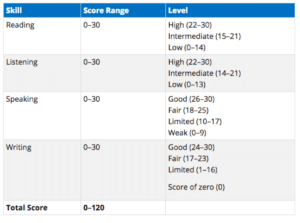
How is TOEFL Graded
The TOEFL has its own scoring scale and framework, and it’s anything but a percent correct score. That implies the most extreme score for the TOEFL test isn’t 100%. Rather, the most extreme score is 120 with 4 segments. Each segment (Reading, Writing, Speaking, and Listening) is worth 30 points.
In contrast to the SAT (Scholastic Aptitude Test) whose purposes of each area are similarly as significant as the generally speaking, with the TOEFL, the combined score out of 120 is the most significant number. Commonly, the schools and universities won’t request that you separate the total score into individual segments.
How is the TOEFL reviewed?

reviewing of TOEFL
The TOEFL is a standardized test, which implies the scores are ‘equated.’ This additionally implies the quantity of right answers you get in the test won’t relate precisely with the last score you get.
This is on the grounds that the TOEFL test producers might want to make the test and results as reasonable as could be expected under the circumstances. In some cases, a form of the test can be more troublesome than another adaptation. So, it won’t be reasonable for everybody stepping through the exam if the percent-correct evaluating framework is utilized. The TOEFL graders, other than taking a look at the good and bad answers, they additionally consider the general execution of everybody taking that test to at last think of the score. So as a rule, the TOEFL scores are practically identical in any event, when test-takers step through various examinations from one another.
Notwithstanding, the ETS doesn’t share their official evaluating and comparing scores framework with general society. So, we don’t actually have a clue how it is evaluated. In any case, remember that regardless of whether you are ‘unfortunate’ and have a troublesome than the normal understanding section, you will in any case be judged reasonably contrasted with other people who have the simpler understanding entry.
Know few last minute tips for TOEFL.
by Labhesh | Nov 24, 2020 | Admissions counselling, IELTS, Motivation, study abroad, Test
On the off chance that you are taking IELTS to concentrate abroad, at that point you will take the Academic IELTS Reading Module. So read the Format of The IELTS Reading Test.
In the event that you are taking IELTS for different purposes, for example, working abroad, at that point you will take the General Training Reading Module.
In any case, improving your reading for IELTS is significant as you will confront some intricate reading and troublesome jargon.

Module of IELTS Reading
About the Reading Test
Both IELTS Reading Tests, Academic and General Training, expect to evaluate the accompanying aptitudes:
- Reading for gist
- Reading for main ideas
- Reading for detail
- Understanding inferences and suggested meaning
- Recognising a scholar’s suppositions
- Attitudes and reason
- Following the improvement of an argument
The tests change in their substance:
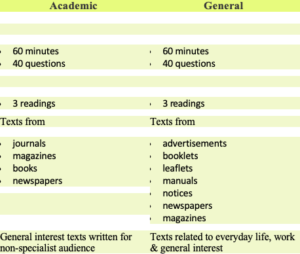
Format of The IELTS Reading Test
The Academic IELTS Reading Module
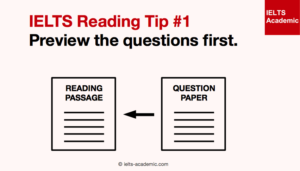
follow this pattern
The Academic IELTS Reading Module takes an hour and there are 40 questions to reply. Each question is worth 1 mark.
The Reading Passages
There are three reading passages with an aggregate of 2,150-2,750 words. Writings are taken from diaries, magazines, books, and papers.
All the points are of general intrigue and the writings have been composed for a non-specialist audience. The readings are planned to be about issues that are proper to competitors who will enter postgraduate or college classes.
In any event one content will contain definite legitimate argument. One of the writings may contain non-verbal materials, for example, charts, outlines or graphs.
On the off chance that there are specialized terms which you may not know in the content then a glossary is given. The writings and questions become more troublesome through the paper.
The Questions
Guidelines are clear and simple to follow and you will be given instances of any new question types. Messages and questions show up on a Question Paper which you can compose on however not detract from the test room.
You should address all questions on an Answer Sheet during the hour – there isn’t additional time toward the conclusion to move your responses to an answer sheet.
The position of the question changes- a portion of the inquiries may precede an entry, some may come in the wake of, depending on the question type.
These are the sorts of question you can hope to find in the test:
- short-answer questions
- multiple decision
- sentence culmination
- notes/outline/graph/stream diagram/table culmination
- choosing a heading for a section
- identification of author’s perspectives/claims – truly, no or not given
- identification of data – true, false or not given
- classification
- matching records/phrases.
There is an answer sheet and you should enter all the questions on there during the test. There is no additional time toward the conclusion to enter the scores. So read the tips of IELTS Reading Test.
Refer to the Format of IELTS Listening Test.
by Labhesh | Nov 23, 2020 | Admissions counselling, IELTS, Motivation, study abroad, Test
Read this following article to Know the Format of IELTS Listening Test and also refer to the tips and format for IELTS Writing Test.

Know the Format of IELTS Listening Test
The listening module endures 40 minutes – 30 minutes listening and 10 minutes to add your responses to an answer sheet. There are 4 areas, each one getting more difficult.
The initial two sections of the test are worried about social needs.
The last two sections are worried about circumstances related all the more near education and training contexts.
All the IELTS listening topics are of general interest and it has no effect what subjects you are wanting to consider or what work you plan to do.
A scope of English pronunciations and vernaculars are utilised in the recordings which mirrors the worldwide use of IELTS
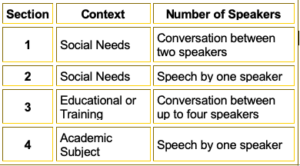
Format in brief
Section One
In the primary segment there is a discussion between two speakers. For instance – a discussion about travel arrangements, booking convenience, or choices on a night out.
Section Two
The subsequent section is a monologue (a discourse by one individual). It will be set in an ordinary social setting. For instance – a discourse about student administrations on a University grounds or plans for suppers during a gathering.
Section Three
Section three is a discussion between up to four individuals. For instance – a discussion between a coach and a student about a task or between three students arranging a research project
Section Four
The last part is another monologue. It is a lecture or talk of general academic interest such as a university lecture.
Question Types
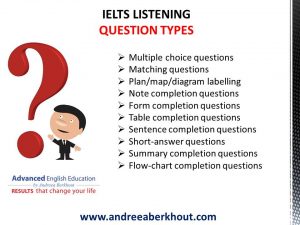
question types
The accompanying sorts of inquiry may show up on the test:
- multiple decision
- short-answer questions
- sentence finish
- notes/rundown/graph/stream outline/table fruition
- labelling a graph which has numbered parts
- classification
- matching
You will be given guidelines on the test paper on the most proficient method to respond to the questions, and they are clear and simple to follow. You will be given instances of any unfamiliar question types.
During the IELTS listening test, you are offered time to read the questions and enter and then check your answers. You enter your answers on the question paper as you listen and when the tape closes ten minutes are took into consideration you to move your responses to an Answer Sheet.
One mark is granted for every one of the 40 things in the test. So to get a perfect score, read the tips for IELTS Listening Test.
by Labhesh | Nov 20, 2020 | Admissions counselling, IELTS, Motivation, study abroad, Test
The IELTS test position additionally changes among Academic and General Training for the Writing Test. Refer to the Tips and Format for IELTS Writing Test mentioned below. Also, know the Format of IELTS Speaking Test.
Format for IELTS Writing Test

get equipped with IELTS Writing Test format
Academic
There is a Task 1 and a Task 2. The test time is an hour. It is prescribed in the test to go through 20 minutes on task 1, as it is worth less marks, and 40 minutes on task 2.
- Task 1 is depicting a chart, outline, process or map.
- Task 2 is composing an academic essay on a subject of general interest.
General Training
Again, there is an undertaking 1 and an assignment 2, with a total test time of an hour, and a suggestion to go through 20 minutes on task 1 and 40 minutes on task 2.
-
Task 1 is composing a letter to somebody, either casual, for example, a companion, or more formal, for example, an organization director, on a given topic.
-
Task 2 is composing an academic essay on a subject of general interest.
Tips:

tips to tackle IELTS Writing section
Do IELTS Writing Task 2 First

complete writing task 2 before task 1
Since IELTS Writing Task 2 is the equivalent on both the Academic and General tests, many think that its simpler than Task 1 (particularly authors of the Academic test). The other significant preferred advantage Task 2 has is that it’s worth a greater mark than Task 1. Obviously, it likewise takes more time to finish. Consequently, it’s ideal to not just dedicate most of your chance to Task 2 yet to finish it first.
You would prefer not to stall out on Task 1 and just leave yourself 20 minutes to wildly compose something for Task 2. IELTS suggests going through 40 minutes on Task 2 and around 20 minutes on Task 1. This is a decent rule obviously; your own experience may vary. Try not to get too worried about adhering to these specific time limits – simply ensure you don’t give more opportunity to Task 1 than you have to.
Avoid Informal Writing
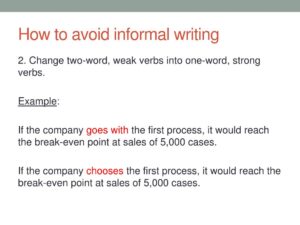
tips to avoid informal writing
This tip applies basically to the Academic test, yet it’s critical to remember for the General test too. While your answers don’t need to be in formal style on the General test, it’s ideal to keep away from certain casual composing rehearses. For example, abstain from utilizing shortenings – write out the full word. Likewise try not to write in the first or second individual (I, me, you) except if instructed to do as such.
Paraphrase, Don’t Copy

paraphrase the text
You ought to never duplicate any piece of the inquiry into your reactions for either Task 1 or 2. Rather, figure out how to reword. You may need to utilize some portion of the questions in your reactions so as to illustrate a point however on the off chance that you do, ensure you put it into your own words.
Practice, Practice, Practice!

keep practicing
The best way to show signs of improvement at writing is to continue doing it. Take the same number of training tests as you can before the genuine test. Get somebody you know with solid English writing abilities to investigate your answers and offer input.
Hope you now are well equipped with the Tips and Format for IELTS Writing Test.
Nevertheless, to avoid 6 common mistakes that students make in IELTS, refer to the link.


















Recent Comments